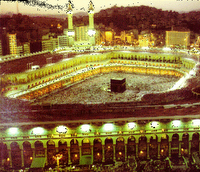
Priest Burns Himself Protesting Islam’s Fast Spread
Protesting the rapid growth of the Muslim population worldwide, and the failure of the Protestant Church’s inability to contain it, Roland Weisselberg a 73-year retired priest committed suicide by setting himself on fire at a German monastery, according to United Press International.
Weisselberg died Wednesday in a hospital after having poured a can of petrol over his entire body at Augustine monastery in the eastern city of Erfurt, where Martin Luther spent six years as a monk at the beginning of the 16th century.
Church officials expressed their shock at the incident, stressing that closer dialogue with Islam was crucial to bridge the gap between Muslims and Christians.
Weisselberg was still holding sermons less than two weeks ago.
Witnesses said the former priest climbed into a building site next to the monastery church, where a Reformation Day service was being held, and began shouting “Jesus and Oskar (apparently referring to Oskar Brüsewitz, a priest who burnt himself in 1976 in protest against the Communist regime in East Germany)” before setting his body on fire.
The Protestant Bishop of Saxony, Axel Noack, said the suicide had shocked the community, adding that the incident shouldn’t affect relations between Christians and the Muslim world.
Statistics show that Islam is the second-largest religion in the world after Christianity. It is also the fastest growing religion on Earth.
Following a period of tension, aroused as a result of a Danish newspaper’s publication of blasphemous cartoons ridiculing prophet Muhammad (PBUH) and Pope Benedict remarks linking Islam to violence, positive initiatives by representatives of both communities, Christians and Muslims ensured that such incidents did not affect the good ties between the followers of the two religions.
Recent months witnessed the set up of various organisations and conferences all aimed at fostering good, meaningful relationships between Muslims and Christians, so that issues of concern to both can be tackled within a framework of mutual respect and deep understanding.
Protesting the rapid growth of the Muslim population worldwide, and the failure of the Protestant Church’s inability to contain it, Roland Weisselberg a 73-year retired priest committed suicide by setting himself on fire at a German monastery, according to United Press International.
Weisselberg died Wednesday in a hospital after having poured a can of petrol over his entire body at Augustine monastery in the eastern city of Erfurt, where Martin Luther spent six years as a monk at the beginning of the 16th century.
Church officials expressed their shock at the incident, stressing that closer dialogue with Islam was crucial to bridge the gap between Muslims and Christians.
Weisselberg was still holding sermons less than two weeks ago.
Witnesses said the former priest climbed into a building site next to the monastery church, where a Reformation Day service was being held, and began shouting “Jesus and Oskar (apparently referring to Oskar Brüsewitz, a priest who burnt himself in 1976 in protest against the Communist regime in East Germany)” before setting his body on fire.
The Protestant Bishop of Saxony, Axel Noack, said the suicide had shocked the community, adding that the incident shouldn’t affect relations between Christians and the Muslim world.
Statistics show that Islam is the second-largest religion in the world after Christianity. It is also the fastest growing religion on Earth.
Following a period of tension, aroused as a result of a Danish newspaper’s publication of blasphemous cartoons ridiculing prophet Muhammad (PBUH) and Pope Benedict remarks linking Islam to violence, positive initiatives by representatives of both communities, Christians and Muslims ensured that such incidents did not affect the good ties between the followers of the two religions.
Recent months witnessed the set up of various organisations and conferences all aimed at fostering good, meaningful relationships between Muslims and Christians, so that issues of concern to both can be tackled within a framework of mutual respect and deep understanding.
Tidak ada komentar:
Posting Komentar